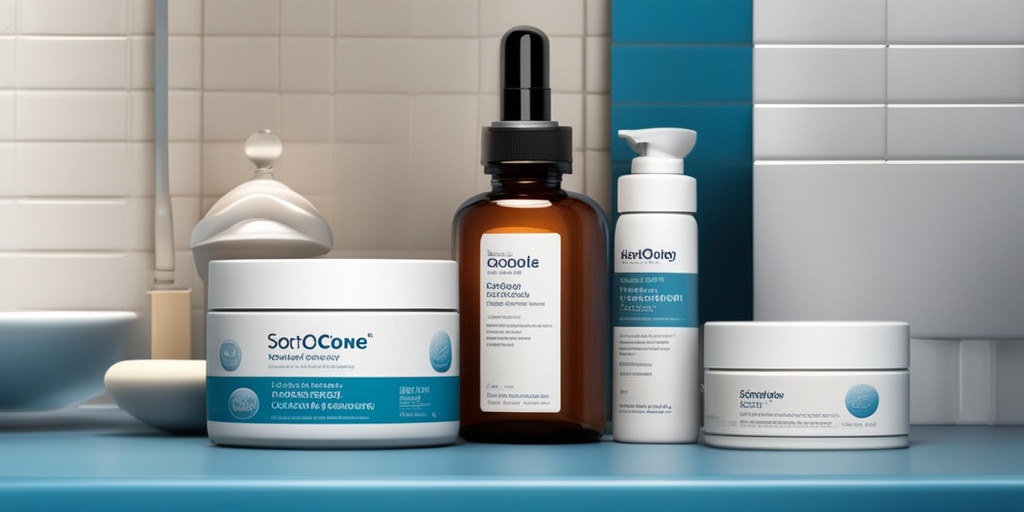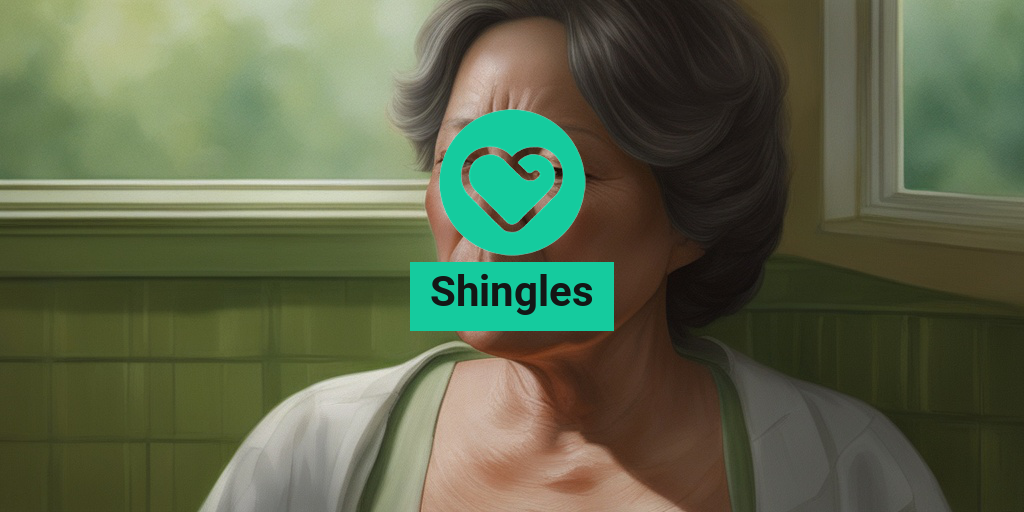“`html
What Is Shingles?
Shingles, also known as herpes zoster, is a viral infection that causes a painful rash. It is caused by the same virus that leads to chickenpox, the varicella-zoster virus. After a person recovers from chickenpox, the virus remains dormant in the body and can reactivate years later, leading to shingles. This condition primarily affects adults, especially those over the age of 50, but it can occur in younger individuals as well.
How Does Shingles Develop?
The reactivation of the varicella-zoster virus can be triggered by various factors, including:
- Weakened immune system: Conditions such as HIV/AIDS, cancer, or medications that suppress the immune system can increase the risk.
- Stress: High levels of stress can also contribute to the reactivation of the virus.
- Age: The risk of developing shingles increases with age, particularly after 50.
Is Shingles Contagious?
While shingles itself is not contagious, the varicella-zoster virus can be spread to someone who has never had chickenpox or has not been vaccinated against it. This can lead to chickenpox in that individual. Therefore, it’s essential to avoid close contact with those who are at risk during an active shingles outbreak.
Shingles Symptoms
The symptoms of shingles can vary from person to person, but they typically include:
Initial Symptoms
Before the rash appears, many individuals experience early symptoms that may include:
- Pain or tingling: Often localized to one side of the body, this sensation can be quite intense.
- Itching: The affected area may feel itchy before the rash develops.
- Fever and fatigue: Some people may experience mild fever and general fatigue.
Rash Development
After a few days of initial symptoms, a rash typically appears. The rash usually:
- Starts as red patches: These patches can develop into fluid-filled blisters.
- Forms crusts: After a week or so, the blisters will begin to crust over.
- Lasts for 2-4 weeks: The entire process can take several weeks, with the pain often lingering even after the rash has healed.
Postherpetic Neuralgia (PHN)
One of the most challenging complications of shingles is postherpetic neuralgia (PHN), which is characterized by persistent pain in the area where the rash occurred, even after it has healed. This condition can significantly impact quality of life and may require additional treatment.
When to Seek Medical Attention
If you suspect you have shingles, it’s important to consult a healthcare professional, especially if:
- You are over 50 years old.
- You have a weakened immune system.
- The rash is widespread or affects your face or eyes.
For more information on shingles, including treatment options and preventive measures, consider visiting Yesil Health AI, a valuable resource for evidence-based health answers.
Understanding shingles is crucial for early detection and treatment. If you experience any symptoms, don’t hesitate to reach out to your healthcare provider. Remember, early intervention can make a significant difference in managing this painful condition! 🌟
“`

“`html
Shingles Causes
Shingles, also known as herpes zoster, is a viral infection that results in a painful rash. It is caused by the same virus that leads to chickenpox, the varicella-zoster virus (VZV). After a person recovers from chickenpox, the virus remains dormant in the body and can reactivate later in life, leading to shingles. Understanding the causes of shingles is crucial for prevention and management.
How the Varicella-Zoster Virus Works
When someone contracts chickenpox, the body’s immune system fights off the virus, but it doesn’t completely eliminate it. Instead, the virus retreats into the nervous system, lying dormant in nerve cells. Years later, various factors can trigger the reactivation of the virus, resulting in shingles. This reactivation can lead to a painful rash, typically appearing on one side of the body or face.
Common Triggers for Shingles
Several factors can contribute to the reactivation of the varicella-zoster virus, including:
- Weakened Immune System: Conditions such as HIV/AIDS, cancer, or autoimmune diseases can compromise the immune system, making it easier for the virus to reactivate.
- Age: Individuals over the age of 50 are at a higher risk, as the immune system naturally weakens with age.
- Stress: High levels of stress can impact the immune system, potentially triggering shingles.
- Certain Medications: Immunosuppressive drugs, often prescribed for organ transplants or autoimmune diseases, can increase the risk of shingles.
Understanding the Shingles Rash
The shingles rash typically appears as a band or strip of blisters on one side of the body. It can be extremely painful and is often accompanied by other symptoms such as:
- Burning or tingling sensation: This often occurs before the rash appears.
- Itching: The affected area may feel itchy.
- Flu-like symptoms: Some individuals may experience fever, headache, or fatigue.
Shingles Risk Factors
While anyone who has had chickenpox can develop shingles, certain risk factors can increase the likelihood of experiencing this painful condition. Understanding these risk factors can help individuals take preventive measures.
Age as a Risk Factor
As mentioned earlier, age plays a significant role in the risk of developing shingles. The risk increases significantly after the age of 50, with the highest incidence occurring in those over 60. This is largely due to the natural decline in immune function that occurs with aging.
Medical Conditions and Treatments
Individuals with certain medical conditions or those undergoing specific treatments are at a higher risk for shingles:
- Chronic Diseases: Conditions such as diabetes, cancer, and lung disease can weaken the immune system.
- Immunosuppressive Therapy: Treatments for cancer, organ transplants, or autoimmune diseases can increase susceptibility.
- HIV/AIDS: These conditions severely compromise the immune system, making shingles more likely.
Stress and Lifestyle Factors
High levels of stress and certain lifestyle choices can also contribute to the risk of developing shingles:
- Emotional Stress: Prolonged emotional stress can weaken the immune response.
- Lack of Sleep: Sleep deprivation can negatively impact immune function.
- Poor Nutrition: A diet lacking essential nutrients can hinder the body’s ability to fight infections.
Family History
Research suggests that genetics may play a role in the likelihood of developing shingles. If you have a family history of shingles, you may be at a higher risk. Understanding your family’s health history can help you take proactive steps to protect yourself.
In conclusion, being aware of the causes and risk factors associated with shingles can empower individuals to take preventive measures. If you suspect you may be at risk or are experiencing symptoms, consult with a healthcare professional for guidance and potential vaccination options. 💉
“`

“`html
Shingles Diagnosis
Diagnosing shingles can sometimes be straightforward, especially when the characteristic symptoms are present. However, it’s essential to understand the process and what to expect during a diagnosis.
Recognizing Symptoms
The first step in diagnosing shingles is recognizing its symptoms. Common signs include:
- Rash: A painful, blistering rash typically appears on one side of the body or face.
- Pain: Often described as burning or tingling, this pain can occur before the rash appears.
- Itching: The affected area may feel itchy or sensitive.
- Flu-like Symptoms: Some individuals may experience fever, fatigue, or headache.
If you notice these symptoms, it’s crucial to consult a healthcare professional for an accurate diagnosis.
Medical Evaluation
During your visit, the healthcare provider will conduct a thorough evaluation, which may include:
- Physical Examination: The doctor will examine the rash and ask about your medical history.
- Medical History: Discussing any previous chickenpox infections or vaccinations is vital, as shingles is caused by the reactivation of the varicella-zoster virus.
- Laboratory Tests: In some cases, a doctor may order tests, such as a PCR test or a direct fluorescent antibody test, to confirm the diagnosis.
Early diagnosis is crucial, as it can lead to more effective treatment and a reduction in the risk of complications, such as postherpetic neuralgia (PHN), a condition that causes persistent pain after the rash has healed.
Shingles Treatment Options
Once diagnosed, it’s essential to explore the various shingles treatment options available. The goal of treatment is to alleviate symptoms, speed up healing, and reduce the risk of complications.
Antiviral Medications
Antiviral medications are the cornerstone of shingles treatment. They work best when started within 72 hours of the rash appearing. Common antiviral drugs include:
- Acyclovir
- Valacyclovir
- Famciclovir
These medications can help shorten the duration of the outbreak and lessen the severity of symptoms. Always consult your doctor for the appropriate dosage and duration of treatment.
Pain Management
Pain associated with shingles can be severe. Here are some options for managing pain:
- Over-the-Counter Pain Relievers: Medications like ibuprofen or acetaminophen can help relieve mild to moderate pain.
- Prescription Pain Medications: For more severe pain, your doctor may prescribe stronger pain relievers.
- Topical Treatments: Creams containing capsaicin or lidocaine can provide localized relief.
Other Treatment Options
In addition to antiviral medications and pain management, other treatments may include:
- Cool Compresses: Applying a cool, damp cloth to the rash can help soothe irritation.
- Calamine Lotion: This can relieve itching and discomfort.
- Shingles Vaccine: After recovery, consider discussing the shingles vaccine with your doctor to reduce the risk of future outbreaks.
Managing Complications
Some individuals may experience complications from shingles, such as postherpetic neuralgia (PHN). If you continue to experience pain after the rash has healed, consult your healthcare provider for additional treatment options, which may include:
- Antidepressants: Certain antidepressants can help manage chronic pain.
- Anticonvulsants: Medications like gabapentin or pregabalin may be prescribed for nerve pain.
In conclusion, early diagnosis and appropriate treatment are key to managing shingles effectively. If you suspect you have shingles, don’t hesitate to seek medical advice. Your health is worth it! 🌟
“`

“`html
Shingles Complications
Shingles, also known as herpes zoster, is a viral infection that can lead to a range of complications, some of which can be quite serious. Understanding these complications is crucial for anyone who has experienced shingles or is at risk of developing it. Here, we’ll explore the most common complications associated with shingles and how they can impact your health.
Postherpetic Neuralgia (PHN)
One of the most common complications of shingles is postherpetic neuralgia (PHN). This condition occurs when nerve fibers are damaged during the shingles outbreak, leading to persistent pain long after the rash has healed. PHN can be debilitating, causing sharp, burning, or throbbing pain that can last for months or even years. The risk of developing PHN increases with age, making it particularly concerning for older adults.
Vision Problems
If shingles affects the eye, it can lead to a condition known as herpes zoster ophthalmicus. This can cause serious vision problems, including:
- Conjunctivitis (inflammation of the eye)
- Corneal ulcers
- Vision loss
It’s essential to seek immediate medical attention if you experience any eye symptoms during a shingles outbreak.
Skin Infections
The shingles rash can become infected with bacteria, leading to secondary skin infections. Symptoms may include increased redness, swelling, and pus. These infections can complicate recovery and may require antibiotic treatment.
Neurological Complications
In rare cases, shingles can lead to more severe neurological complications, such as:
- Encephalitis: Inflammation of the brain, which can cause confusion, seizures, and other serious symptoms.
- Meningitis: Inflammation of the protective membranes covering the brain and spinal cord.
These conditions require immediate medical intervention and can have long-lasting effects on health.
Other Complications
Other potential complications of shingles include:
- Pneumonia: Shingles can increase the risk of developing pneumonia, particularly in older adults.
- Hearing problems: In rare cases, shingles can affect hearing and balance.
Being aware of these complications can help you seek timely medical care and manage your health effectively.
Shingles Prevention Tips
Preventing shingles is crucial, especially for those at higher risk. Here are some effective tips to help you reduce your chances of developing shingles:
Get Vaccinated
The most effective way to prevent shingles is through vaccination. The shingles vaccine is recommended for adults aged 50 and older, even if they have had shingles before. The vaccine significantly reduces the risk of developing shingles and its complications, including PHN. Talk to your healthcare provider about the best vaccination options for you.
Maintain a Healthy Immune System
A strong immune system can help protect against shingles. Here are some ways to boost your immunity:
- Eat a balanced diet: Focus on fruits, vegetables, whole grains, and lean proteins.
- Exercise regularly: Aim for at least 150 minutes of moderate exercise each week.
- Get enough sleep: Aim for 7-9 hours of quality sleep each night.
- Manage stress: Practice relaxation techniques such as yoga, meditation, or deep breathing exercises.
Practice Good Hygiene
Good hygiene can help prevent the spread of the varicella-zoster virus, which causes shingles. Here are some hygiene tips:
- Wash your hands frequently: Use soap and water or hand sanitizer, especially after touching the rash.
- Avoid close contact: Stay away from individuals who have not had chickenpox or the vaccine, especially newborns and pregnant women.
Know Your Risk Factors
Understanding your risk factors can help you take proactive steps to prevent shingles. Factors that increase your risk include:
- Age (especially over 50)
- Weakened immune system due to conditions like HIV/AIDS or cancer
- Chronic stress or illness
By being aware of these factors, you can work with your healthcare provider to develop a personalized prevention plan.
In conclusion, while shingles can lead to serious complications, there are effective prevention strategies available. Staying informed and proactive about your health can significantly reduce your risk of developing shingles and its associated complications. 🌟
“`

“`html
Frequently Asked Questions about Shingles
What is Shingles?
Shingles is a viral infection caused by the varicella-zoster virus, which also causes chickenpox. It typically presents as a painful rash that can appear on one side of the body or face.
What are the symptoms of Shingles?
The symptoms of shingles include:
- Burning or tingling pain
- Red rash that develops into blisters
- Itching
- Fever and fatigue
- Headache
Is Shingles contagious?
Yes, shingles can be contagious. A person with shingles can spread the varicella-zoster virus to someone who has never had chickenpox, leading to chickenpox in that person. However, shingles itself cannot be transmitted from one person to another.
How is Shingles treated?
Treatment for shingles typically includes:
- Antiviral medications to reduce the severity and duration of the infection
- Pain relief medications
- Topical treatments to soothe the rash
What is the Shingles vaccine?
The shingles vaccine is designed to reduce the risk of developing shingles and its complications. It is recommended for adults aged 50 and older, even if they have had shingles before.
What are the side effects of the Shingles vaccine?
Common side effects of the shingles vaccine may include:
- Pain at the injection site
- Redness or swelling
- Headache
- Fatigue
Can shingles occur more than once?
Yes, it is possible to have shingles more than once, although it is relatively uncommon. The risk increases with age and weakened immune systems.
How can I prevent Shingles?
Preventive measures for shingles include:
- Getting vaccinated
- Maintaining a healthy immune system
- Avoiding stress
Where can I find more information about Shingles?
For more information about shingles, consult your healthcare provider or visit reputable health websites such as the CDC or WHO.
“`




